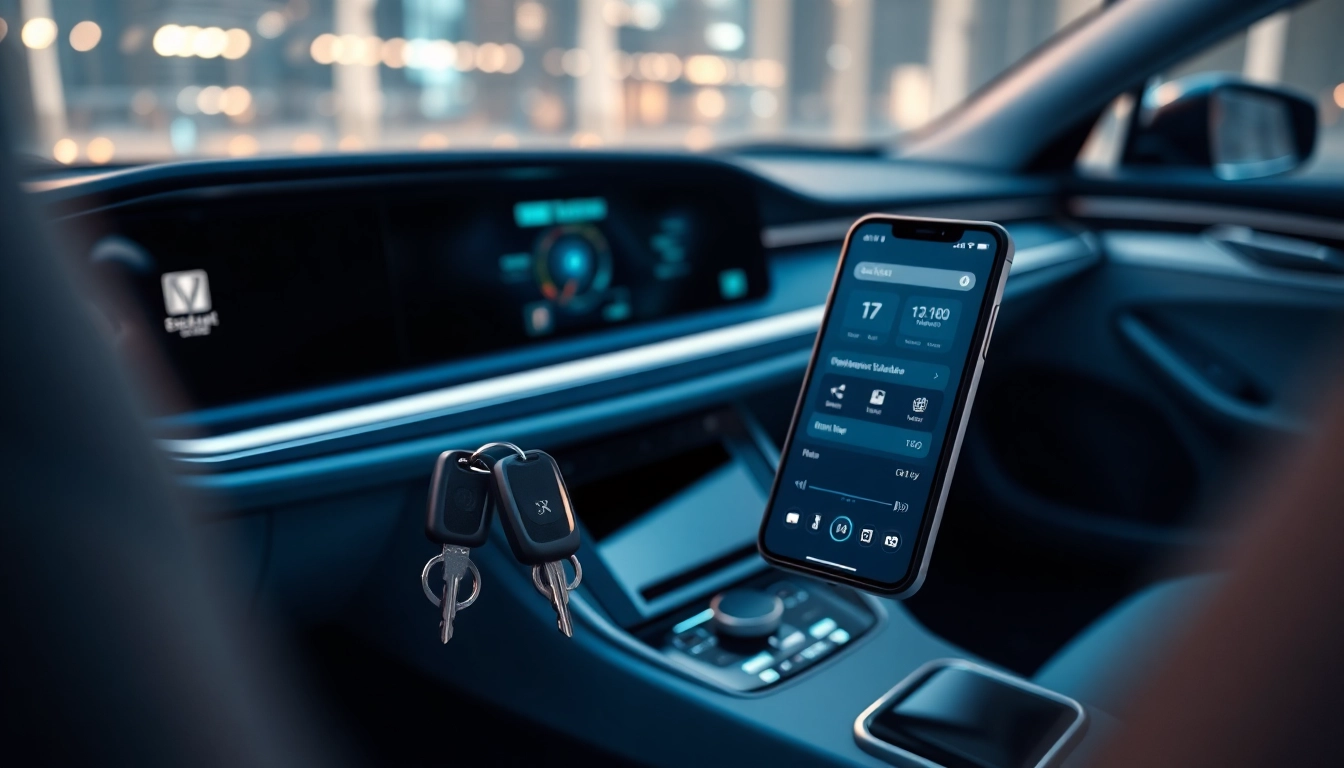The Evolution of Keys for Electric Cars
History of Car Keys and Their Transition to Electric Vehicles
Car keys have long been the primary means of accessing and operating vehicles, evolving from simple mechanical designs to sophisticated electronic systems. Initially, car keys were nothing more than metal blades that operated mechanical locks. Over the decades, triggers in automotive technology spurred a transformation, leading to the introduction of remote keyless entry systems, which gained popularity in the late 1980s and early 1990s. These systems allowed drivers to unlock their vehicles from a distance, a precursor to today’s advanced key technologies.
As electric vehicles (EVs) started to emerge on the market, the need for keys evolved further. The design of Keys for electric cars is a reflection of this new landscape, blending convenience, security, and technology. EVs leverage unique features like smartphone integrations and secure access options, reshaping consumer expectations surrounding vehicle access.
What Are Smart Keys and How Do They Work?
Smart keys represent a significant advancement in key technology, incorporating wireless functionality that communicates with the vehicle when the key is within proximity. These keys typically include a fob equipped with a transmitter that sends a signal to the car, allowing it to unlock or start without inserting a physical key. The smart key system relies on several components, including keyless entry sensors, vehicle security protocols, and often, advanced encryption methods to enhance security.
In addition to locking and unlocking features, many smart keys can be programmed to personalize driving settings, such as seat position, climate control preferences, and even favorite radio stations. This personalization marks a considerable improvement in user experience and functionality, catering to the diverse needs of modern drivers.
Comparative Analysis: Traditional Keys vs. Keys for Electric Cars
The comparison between traditional keys and keys for electric vehicles underscores a major shift in technology and user expectations. Traditional keys are generally mechanical, requiring physical insertion into a lock or ignition system. While effective, they offer limited security features and do not adapt to user preferences. In contrast, keys designed for electric cars often utilize advanced algorithms and connectivity features that provide enhanced security and convenience.
One of the critical differences lies in battery management systems. Electric car keys, particularly smart keys, incorporate battery management features that traditional keys lack. This evolution helps ensure that the vehicle can be accessed even when the battery life is low. Furthermore, unlike traditional keys that can be easily duplicated, keys designed for electric cars employ high-level encryption to mitigate theft risks, representing a robust advancement in automotive security.
Types of Keys for Electric Cars
Key Fobs: Traditional vs. Digital
The first major category of keys for electric vehicles is the key fob. Traditional key fobs often mirror their mechanical counterparts in terms of usage but introduce electronic features like remote locking and unlocking. Digital key fobs take this a step further, integrating seamlessly with the vehicle’s electronic systems, allowing for functionalities such as automatic unlocking as the driver approaches the vehicle.
Digital key fobs also provide significant advantages in usability and security, as they can often be controlled via smartphone applications. Users have the option to unlock their vehicle using their phones, completely bypassing the physical need for a key fob. This advancement not only enhances convenience but also aligns with the tech-savvy lifestyle of many electric vehicle owners.
Mobile App Integration for Enhanced Access and Control
Mobile application integration has revolutionized how users interact with their vehicles. Many electric vehicles come with dedicated smartphone apps designed to control key functions remotely. These apps enable users to lock or unlock their cars, start the engine, and even monitor battery levels from anywhere, provided they have an internet connection.
This technology offers profound implications for user flexibility and enhances overall convenience. Users can allow access to their vehicles without needing to be physically present, which is invaluable in various scenarios, such as lending the car to a friend or family member. Moreover, these apps often include features such as location tracking, helping owners locate their vehicles in crowded parking lots.
Emerging Technologies: Biometric and Voice-Controlled Access
Emerging technologies in key systems are paving the way for even more innovative features in electric vehicles. Biometric verification, such as fingerprint or facial recognition, offers an advanced method for accessing and starting vehicles. This tech provides a higher degree of security, as it is tailored specifically to the individual user.
Voice-controlled access is another exciting frontier. By integrating technology powered by artificial intelligence, drivers can unlock their cars or even adjust various settings merely by speaking commands. These advancements highlight the trend toward hands-free and seamless user experiences in vehicle operation.
Advantages of Using Keys for Electric Cars
Improved Security Features and Theft Prevention
One of the primary advantages of modern keys for electric cars lies in their enhanced security features. As vehicle theft has evolved, so have the strategies to combat it. Keys for electric cars often employ cryptographic protocols that make it incredibly difficult to duplicate the signal emitted by the fob or smartphone app. This evolution addresses many shortcomings of traditional systems, making vehicles less susceptible to unauthorized access.
Additionally, many electric car systems incorporate features such as anti-theft alarms and tracking capabilities, allowing owners to track their vehicle’s location in real-time. These enhanced security measures not only serve to protect the vehicle but also foster peace of mind among owners concerning the safety of their assets.
Convenience and User Experience Enhancements
Convenience is another significant benefit of innovative keys for electric vehicles. The ability to control multiple vehicle functions from a smartphone app transforms the overall user experience. From remotely starting the car on cold mornings to monitoring charging status, the features available through advanced key systems greatly simplify the complexities associated with electric vehicle ownership.
These user-centric enhancements also extend to personalized settings, where the vehicle automatically adjusts to the preferences of specific users identified by their keys. This added layer of convenience arrives naturally with the transition to electric vehicle technology.
Cost-Effectiveness: Long-Term Benefits of Smart Keys
While the initial cost of smart keys and related technologies may be higher than traditional car keys, they often prove to be more cost-effective in the long run. Improved security features reduce the likelihood of theft, which can be a major financial burden for vehicle owners. Furthermore, the integration of smartphone functionality and automated features can lead to reduced wear on the vehicle’s mechanical systems, as users rely less on manual operation.
As electric vehicle technology continues to improve, the long-term benefits of smart keys for vehicle operation will likely magnify, making them even more attractive to both current and potential electric car owners.
Challenges and Considerations for Electric Car Keys
Battery Life and Maintenance Requirements
Despite the numerous advantages, the introduction of keys for electric cars does come with challenges. One primary concern is battery life. Most smart keys and digital fobs require batteries to operate, and battery maintenance is essential to ensure consistent functionality. Owners must remain vigilant about the battery status of their keys to avoid being stranded.
Moreover, the implications of battery failures extend beyond mere inconvenience, as some electric vehicles may have systems that render them inoperable without functioning keys. Regular checks and even proactive battery replacements can help mitigate these issues and maintain uninterrupted access to the vehicle.
Compatibility Issues Across Different Models
Compatibility presents another significant challenge for electric car keys. As different manufacturers implement varying levels of technology, consumers may find themselves dealing with compatibility issues among different vehicles and key systems. This fragmentation can be frustrating, especially when vehicle owners switch models or brands.
To navigate this landscape, potential electric vehicle owners should conduct thorough research before purchase, verifying compatibility, and understanding how different key systems function. Doing so will alleviate potential difficulties down the line and enhance the overall ownership experience.
User Adaptation: Overcoming Traditional Mindsets
Adapting to new key technologies can present a mental hurdle for some users accustomed to traditional key systems. This transition involves not only learning how to use new devices but also embracing new security protocols and functionalities. Resistance to change should be addressed through education and informed user support provided by manufacturers and dealerships.
Workshops, tutorials, and user guides can be invaluable resources that provide the necessary knowledge to effectively navigate the use of modern vehicle keys. By familiarizing users with the technology, companies can foster confidence in the use of keys for electric cars, ensuring a smoother transition.
The Future of Keys for Electric Cars
Trends in Automotive Technology and Key Innovations
Looking ahead, the landscape for keys in electric vehicles appears primed for innovative trends driven by advancements in automotive technology. Emerging technologies, such as artificial intelligence and machine learning, are set to further enhance user experiences and vehicle interactivity. Continuous integration of smart technologies will provide automated responses, customized settings, and even predictive capabilities that align with driver habits.
Creative innovations, such as the development of ultrasonically powered keys, are also under exploration, moving towards a future where keys may not even require batteries. The focus will increasingly shift towards ensuring maximum practicality while enhancing the sense of security installed in vehicle design.
Regulatory Considerations Impacting Key Technology
Regulatory factors will undoubtedly play a significant role in shaping the future of keys for electric vehicles. As technology develops, regulations surrounding data security, cybersecurity, and encryption standards must keep pace with innovation. Additionally, standards aimed at ensuring user privacy and data protection will necessitate continued attention from manufacturers as a vital aspect of technology deployment.
Legislation affecting smart vehicle technologies will continue to evolve, and organizations in the automotive industry must remain agile and responsive, aligning their product strategies with the necessary compliance frameworks set forth by governing bodies.
Consumer Preferences and Market Predictions
As electric vehicle adoption grows, consumer preferences will drive significant changes in the design and functionality of keys for electric cars. Shifting focus towards sustainable practices will influence demand for smart keys that minimize environmental impact. Consumers will likely favor technology that resonates with their values, emphasizing sustainability, security, and user experience.
Market predictions indicate that the adoption of advanced key systems will accelerate in tandem with electric vehicle growth. Enhanced functionalities combined with increasing consumer acceptance of new technologies will likely ensure a robust future for the use of keys in electric vehicles.



